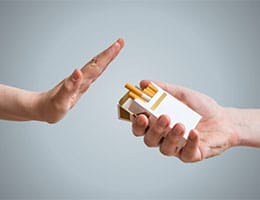 The verb to smoke comes from the Latin word fumāre , which can be translated as "expel smoke." That is why the first meaning of the term mentioned in the dictionary of the Royal Spanish Academy ( RAE ) refers to launching or throwing smoke : a mixture of gases that is generated by combustion and that carries particles in suspension.
The verb to smoke comes from the Latin word fumāre , which can be translated as "expel smoke." That is why the first meaning of the term mentioned in the dictionary of the Royal Spanish Academy ( RAE ) refers to launching or throwing smoke : a mixture of gases that is generated by combustion and that carries particles in suspension.
The most common use of the concept, however, is associated with what a person does when he inhales and expels smoke from some type of cigar, cigarette, pipe , hookah or other similar item .
Smoking generally consists of burning tobacco and inhaling part of the smoke generated by combustion . Through this practice, the smoker absorbs various substances that generate changes in their body, such as nicotine .
Smoking, in this framework, is a harmful habit that affects health . It has been shown that smoking can lead to the development of chronic obstructive pulmonary disease and lung cancer , for example. That is why there are campaigns to discourage the practice and limitations and prohibitions are established for the advertising and consumption of cigarettes in public.
In any case, smoking tobacco is usually a behavior permitted by the authorities. On the other hand, at a general level, smoking other substances such as marijuana or opium is prohibited by law . This makes conventional tobacco cigarettes a legal drug that is marketed and can be smoked without major obstacles.
Among the worst aspects of this habit is the fact that it affects both smokers and the people around them, without neglecting the damage it causes to the environment. It is a custom that many groups try to abolish once and for all, through awareness campaigns about all the ways in which it harms us, but which is still quite popular today.
Since smoking can lead to addiction , quitting is not easy for everyone. For this reason, there are various treatments and products specifically aimed at smokers to help them overcome their problem. Let's see below some of the best tips to quit smoking permanently:
 * determine the date of the last cigarette : since the taste for tobacco cannot disappear overnight, it is important to impose on ourselves the obligation to quit, and then allow the body to adapt to a healthier way of living, so that Over time you can even reject this and other harmful substances;
* determine the date of the last cigarette : since the taste for tobacco cannot disappear overnight, it is important to impose on ourselves the obligation to quit, and then allow the body to adapt to a healthier way of living, so that Over time you can even reject this and other harmful substances;
* change the routine : smokers usually have their day well organized around cigarettes, and that is why it is very useful to alter the schedules to "trick" the body. In this framework, recovering old hobbies or looking for new ones works very well;
* exercise : this is the eternal advice, which is useful in almost all self-improvement projects. The body needs to stay active, and the incentive of looking better is ideal to reject tobacco little by little;
* drink plenty of water : quitting smoking is also purifying the body, and there is no better recipe than hydrating it adequately. If we make sure to drink at least 1.5 liters a day, we will be well on our way.
In colloquial language, finally, smoking can be used in different ways with a symbolic meaning. The concept can be used to refer to the improper or exaggerated consumption of something or the fact of being forced to tolerate some situation : "I'm sure that Juan is going to smoke the inheritance in a few months and then he will be left without money," "I'm still I have to smoke my boss for another three hours before leaving the office .
